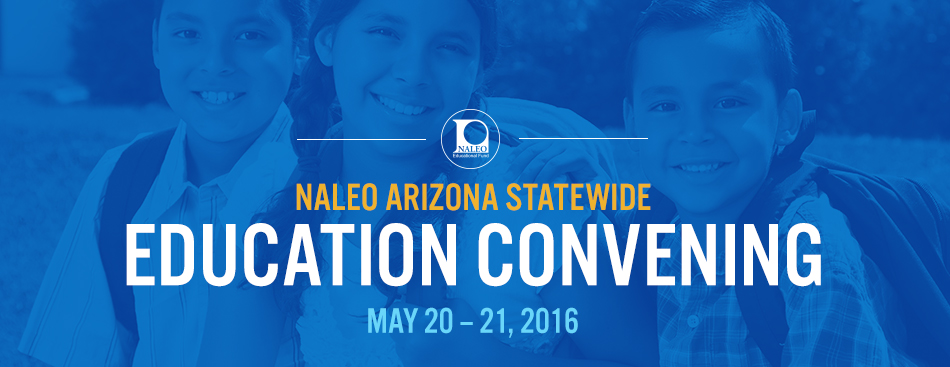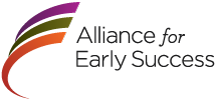
About
May 20-21, 2016 | Tempe, Arizona
From early childhood education to post-secondary and workforce opportunities, the increased access to quality educational systems holds long-term economic and civic benefits for all students and families across Arizona. It is important policymakers are familiar with innovative and successful policies and practices that can drive change in their local communities as they advocate for quality educational services.
This two-day convening provided participants with an overview of Arizona’s educational policies and academic outcomes for families and students across early childhood education, K-12, and post-secondary education. Participants had an opportunity to engage in conversations about the role stakeholders and policymakers can play across the entire educational pipeline to strengthen the access and quality of systems to support a stronger workforce across the state.
This convening is part of the NALEO Education Leadership Initiative (NELI) which aims to provide Latino public servants with the enhanced capacity and governance skills they need to become effective advocates for their students, families, and communities. Participants who attended this two-day convening heard from leading experts from the public, private, and non-profit sectors who tackled pressing education topics in an institute that will include the following curriculum:
- The Arizona We Want, Cultivating the Civic Engagement We Need
- Foundations of Early Childhood Education
- Serving the Needs of Diverse Families – Tackling Toxic Stress
- Addressing Arizona’s Educator Shortage: Strategies to Ensure they Come and are Supported to Teach
- Beyond Math, Reading, and Writing: Preparing Students and Families with the Skills for Post-Secondary Success
- Barriers to College Completion: Addressing Developmental Education
- Developing Strategies for Post-Secondary and Workforce Partnerships
The policy institute convened state legislators, local policymakers, national and state experts, private sector representatives and other key stakeholders. Institute participants had an opportunity to engage with national, regional and education experts who helped deepen their understanding of the most pressing education policy issues facing the state. Policymakers received timely information, learned best practices, exchanged policy ideas, strengthened governance skills that support effective leadership, and had the opportunity to network with colleagues and experts from throughout the state.
Sponsors
Institute Title Sponsor

Foundation Partners

![]()
Schedule
- Friday, May 20
- Saturday, May 21
8:00 a.m. – 9:00 a.m.
Registration & Breakfast
9:00 a.m. – 9:30 a.m.
Welcome Remarks
9:30 a.m. – 10:00 a.m.
Session I:
The Arizona We Want, Cultivating the Civic Engagement We Need
Latinos comprise 31% of the population in Arizona and ensuring their political, economic, and educational success is critical to the future prosperity of the state. By 2020, 68% of all jobs in Arizona will require a postsecondary degree. In order to meet the economic and civic needs of the state, every child and student needs access to quality educational services and systems. Education has the power to serve as that vehicle that can mobilize and engage communities. This session provided an overview of key indicators across the state that highlight policies and practices that can enhance the long-term opportunities for Latinos and all of Arizona.
Chair:
Hon. Steve M. Gallardo, Supervisor, Maricopa County, Arizona; Former Board Member, NALEO
• Ms. Darcy Renfro, Senior Director, The Arizona We Want, Center for the Future of Arizona
PRESENTATION
Additional Resources:
The Invisible Ones
The Invisible Ones: Policy Brief
10:00 a.m. – 12:00 a.m.
Session 2:
Foundations of Early Childhood Education
There is growing research demonstrating the short and long-term benefits of early childhood education for children, families, and communities. Evidence shows that a child’s brain has the greatest potential to grow by the age of three and it is in these first three years of life that children’s brains must be exposed to quality interactions to stimulate and strengthen brain development, an important precursor of school readiness. This session provided an overview of brain development research and will also highlight the importance of utilizing practices that are responsive to diverse families and that support key cognitive and emotional functions in young children.
• Dr. Sarah R. Lytle, Director of Outreach and Education, Institute for Learning & Brain Sciences, University of Washington
PRESENTATION
Additional Resources:
The Heckman Equation
Arizona Early Childhood Development
12:00 p.m. – 1:30 p.m.
Luncheon Program
President’s Address:
Hon. Michele Martinez, Councilmember, City of Santa Ana, California; NALEO President
Keynote Remarks:
Hon. Ruben Gallego, Member, U.S. House of Representatives (D-AZ)
Luncheon Remarks:
Dr. Timothy L. Ogle, Executive Director, Arizona School Boards Association
• Ms. Tracey Benson, Associate Executive Director, Arizona School Boards Association
Additional Resources:
Arizona School Board Association
1:30 p.m. – 3:15 p.m.
Session III:
Serving the Needs of Diverse Families – Tackling Toxic Stress
Infants exposed to healthy and nurturing environments develop the foundation needed for positive brain development and school readiness. Exposure to factors such as poverty, abuse, neglect, and family separation can trigger the development of toxic stress in young children and can have lasting emotional, social, and cognitive effects. Recognizing the limitations of a child’s environment is important, but strides can be made when the strengths their families and communities hold are uplifted to tackle the factors associated with toxic stress. This session provided an overview of the research on toxic stress and ways in which policymakers can develop policies to support healthy environments to mitigate these factors while strengthening family, community, and cultural connections.
Chair:
Hon. Fernando J. Shipley, Regional Chairman, Gila Regional Council; First Things First; Board Treasurer, NALEO
• Ms. Andi Fetzner, Trainer & Consultant, Arizona Trauma Institute
PRESENTATION
• Ms. Elizabeth Barker Alvarez, Vice President, Communications and Public Affairs, First Things First
PRESENTATION
Additional Resources:
Adverse Childhood Experiences
The Impact of Early Adversity on Children’s Development
The Science of Early Childhood Development
3:15 p.m. – 2:30 p.m.
Closing Remarks & Evaluations
5:00 p.m. – 7:00 p.m.